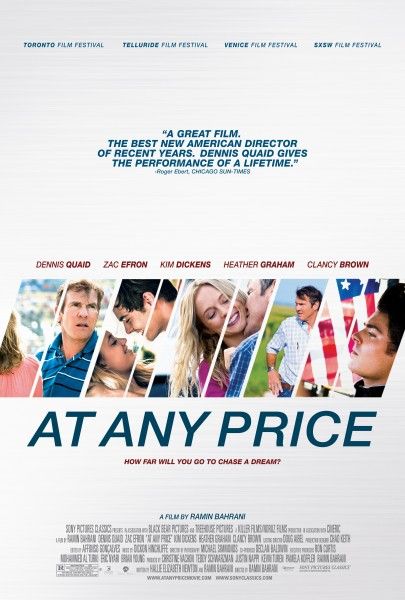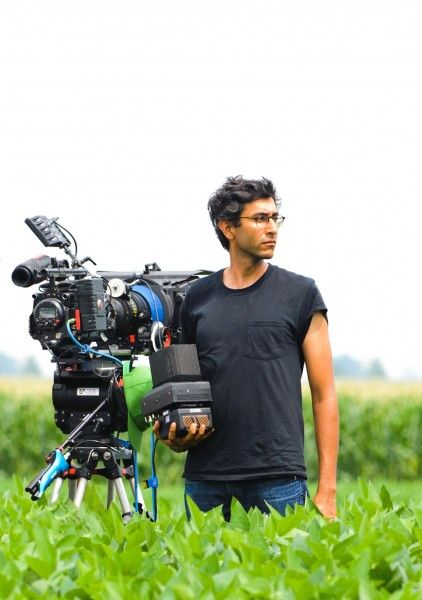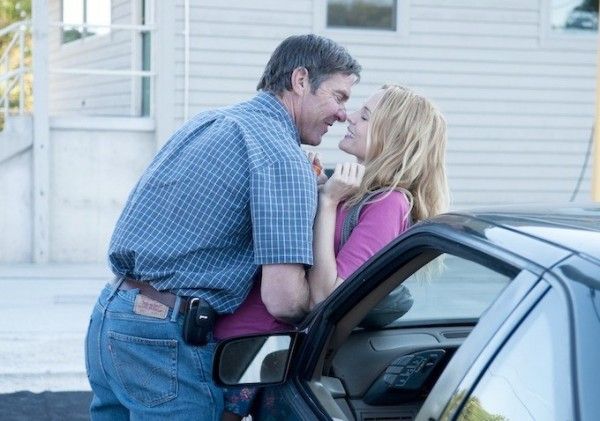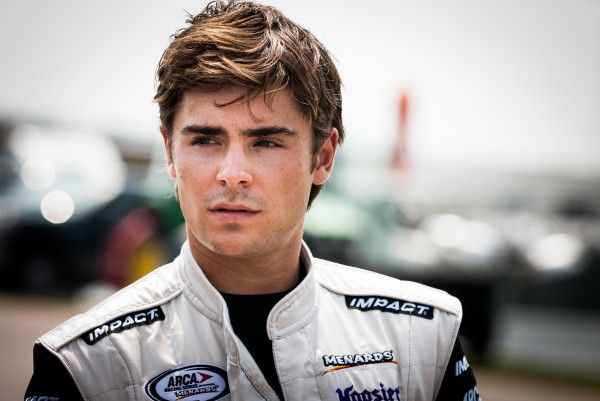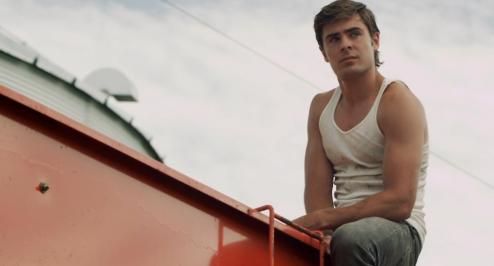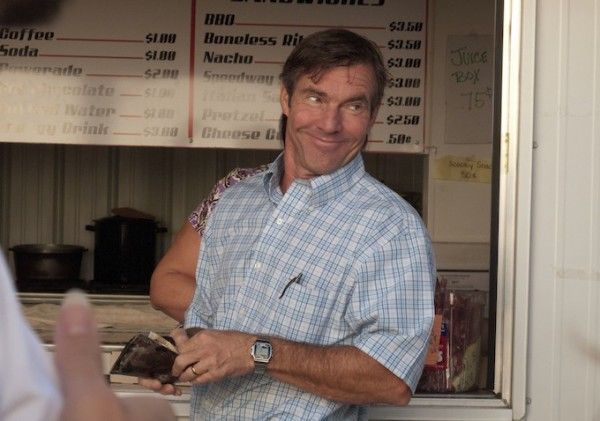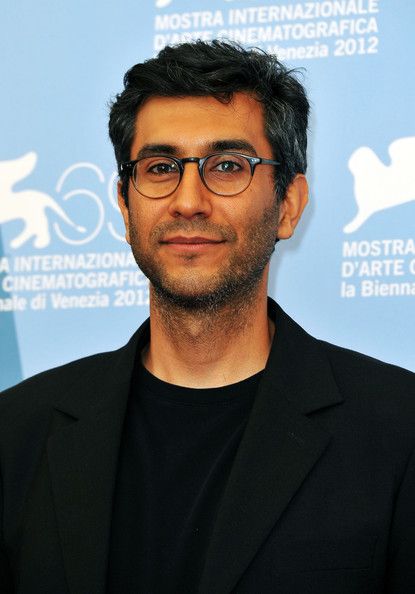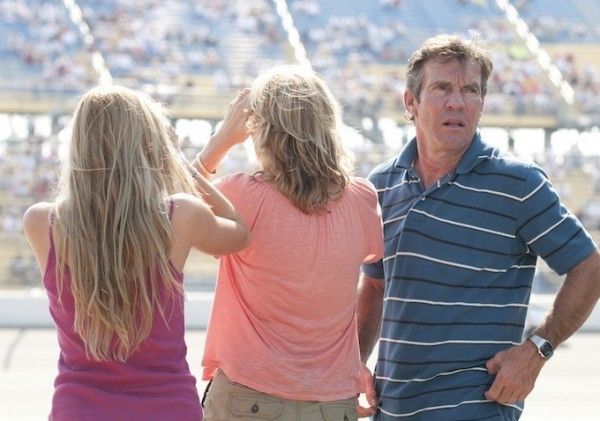Ramin Bahrani paints an unusually dark portrait of life in the Iowa heartland set against the backdrop of today’s fiercely competitive world of high-tech agribusiness in his new film, At Any Price. Opening in theaters on April 26th, the drama melds timeless themes of fathers and sons, ambition and rebellion, morality and survival, with a sharply de-romanticized view of modern farming. The film stars Dennis Quaid, Zac Efron, Kim Dickens, Heather Graham and Maika Monroe and marks Bahrani’s first film with a larger budget and cast of professional actors.
During the interview, Bahrani and Quaid described the film as a modern day version of Death of a Salesman and Quaid’s character as a Willy Loman for our times who’s chasing the American dream and corrupting himself in the process. Quaid discussed what attracted him to the complex role, how he prepared, and why he chose not to judge his character. Bahrani revealed how he feels the film reflects the world we live in today and provides a stark commentary on the state of the American dream, the economic pressures we now face, and how far some people will go to protect their way of life. He also discussed his next project which focuses on the Florida housing crisis. Hit the jump to read more:
Question: When you first read the script, what was your reaction to playing the role?
Dennis Quaid: It’s a very meaty role. It gives you something very interesting to play. It’s a very complex character. Ramin and Hallie (co-writer Hallie Elizabeth Newton) wrote such a great script. Ramin and I talked a lot about Death of a Salesman before shooting the film and how Henry Whipple was in a way a Willy Loman for our times. He’s somebody who’s chasing the American dream for himself and his family, and at the same time, corrupting himself in the process of it.
Did you ever know anyone similar to Henry?
Quaid: I’ve known people a little bit similar to Henry. Yes. But the farmers that I met were really warm, goodhearted people, and it just happened to be Henry’s character.
Did you make any moral judgments about Henry and his methodology?
Quaid: We tried not to be judgmental. I think characters judge themselves. We all judge ourselves and are harder on ourselves. At the beginning of the film, Henry is really an unlikeable character in many ways. He’s like a used car salesman. He’s trying to sell you something, and he shows his confident, successful exterior to the world, but inside there’s self-loathing and insecurity going on at the same time as he’s trying to hold all this up. He starts to crack as the film goes along.
How did you research your role? Did you talk to farmers and people in the community to get a feel for what it is to be a farmer and how people relate to each other?
Quaid: My grandfather was a cotton farmer in east Texas, and I spent a lot of time in the summers up in rural east Texas. It’s a much different world today. I basically parachuted into this movie from another film I was doing at the time called The Words where I was playing this jaded, cynical novelist. Of course, Ramin and I had talked for months about the role and about the movie, and I’d done a lot of reading, but getting there, I relied on him. We shot on the Herman’s farm. Kevin Herman was the head of the family, and I did everything I could to absorb in such little time what I could and kept going as we went along. Luckily, I also had Ramin who is a master of his subject and really knows.
When you started shooting, did the script go through any changes?
Ramin Bahrani: Yes, because the actors come and you start seeing things happen for real. Actually, there was not a lot of time to make the film. It’s not a big budget film. I shot the entire movie on a Handycam with some interns and then I edited it together. In fact, I have the whole movie edited together on my phone. I like to tell the actors what’s going on, and that this is the scene, and this is the blocking of the scene, and these are my five camera set-ups.
Quaid: (laughs) So why did we need to rehearse?
Bahrani: That’s true. But, at the same time, I like to give the actors the freedom, and they know they have the freedom, to change anything they want at any time. I remember we were shooting a scene one time. It was a very complex scene where Zac, Dennis and Kim Dickens are on the property, and these two agents show up in a car, and Zac is going to become physically violent. I looked at the sun and the sun was way low on the horizon. I asked the cameraman, “How much time do we have before we lose the light?” He said, “An hour and a half.” Now, to shoot a scene like that, you probably need five or six hours. I said, “Oh my God.” I quickly told my actors, “Here’s the blocking. This is the scene. These are the previous scenes. Remember where you are emotionally. Let’s start shooting.” I was running back to the camera to turn it on and start to work, and Dennis said, “Excuse me.” I was like, “Oh no.” He said, “I don’t know about this. I don’t know if my character would behave this way.” I said, “What do you think your character should do?” He said, “I think I would do this.” I looked at the sun which had gone even lower, and I said, “You’re right.”
I told the other actors, “I don’t really know what Dennis is going to do, but you have a gist of what I want.” I set up a second camera. I knew how to do it from previous films. I set up a series of lenses on one camera, and I put a zoom on the other camera, and I said, “Let’s start shooting. The first take, I’m going to shoot it.” Dennis did what he wanted to do, which was better than what had been written, and then I toned it down a little bit and shuffled everybody else accordingly, and we kept shooting. We managed to finish the scene, and I even got an extra camera set-up. There was still time. Thank God. At some point, actors start to know things. It happens. I may know the whole film better than them, but they do know what they’re up to often better than me, and I have to give them the room to do that.
Was that also because of the preparation you’d done with your own camera?
Bahrani: That helps, because I prepare everything, and on the day, I can change everything. I mean, suddenly I turned the zoom lens into day one. It was never part of my plan. So, you shuffle everything accordingly. You have to let life come and go. I never say “Action” or “Cut.” Never. I think that would disturb the life from happening in and around everything.
You and Clint Eastwood. Clint doesn’t do that either.
Bahrani: Oh, I didn’t know that.
Henry was struggling to deal with his sons, neither of whom saw their future behind the wheel of a tractor. Did you draw on any personal experience in terms of your relationship with your own children?
Quaid: My oldest son, Jack, would be the nearest age. We have a much different relationship than Zac’s character and my character had in this film. Henry is trying to pass down this farm to Dean which is a tradition in farming, because there’s actually a legacy to give which is the land. That means something. It means I got it from my father. He got it from his father. But Dean just wants to be a race car driver. It’s not a whole lot like my relationship with Jack, although Jack is an actor. I would like my kids to follow their bliss.
If your kids said, “Dad, I want to be a race car driver,” which is such a dangerous sport, would you go for it?
Quaid: What are you going to do once they get it into their heads?
Bahrani: Also, we’re living in a time period where if a kid is on a plastic scooter that’s one inch off the ground, mom and dad think he should have a helmet on. I don’t think they should have a helmet on. They should break their leg and have an imagination. Otherwise, we’re going to have a nation of accountants.
Quaid: Or lawyers to sue about the helmets. We didn’t have any helmets when I was a kid.
Bahrani: And then, you risk and have an imagination. Now it’s like someone goes on a trip to Paris and they think it’s a life experience.
There’s a scene in the film where Dean is on the racetrack and suddenly eases off the accelerator. What was your intent?
Bahrani: I think that the real killer inside of Dean has nothing to do with race cars or Brad Johnson (Ben Marten). The real killer inside of Dean is about money and power. He’s going to make his granddad (Red West) proud by turning that business into something massive. That’s the real person inside of him. Sometimes we have dreams, but we just can’t make them. That’s normal. I mean, Dennis and I are lucky that we had dreams and they managed to work out. They often don’t, and that’s just the way life is. It doesn’t mean it’s good or bad. It’s just how things are.
Quaid: I saw that moment as him coming to that point of “Oh, I don’t belong here. Maybe I don’t have what it takes.” But I think Ramin’s right about Zac’s character in the end. Zac’s character is even more ruthless than Henry.
Can the Whipples hold onto their way of life considering the moral dilemma they face towards the end of the film? Did you have any concerns about the credibility of the movie or did you ever consider changing the script?
Bahrani: No. I thought it was believable the same way I think, as Dennis likes to say, in 20 minutes or in 20 years, their lives may be over when something is discovered under the ground.
Quaid: It’s a buried secret.
Bahrani: I don’t know what would happen in 20 minutes. Someone could knock on the door.
It’s unusual to see a film that ends on such a morally ambiguous note. You’re given a message that says, “Go ahead and do this. It’s okay. You won’t get caught.”
Quaid: I think it’s more of a question than a message.
Bahrani: Also, I spent so much time on the farms. I tried to bring what I was seeing into the movie, but I also live in a world, and so, I was trying to bring the world into my movie. The world that I’m living in today says that you do get away with it. The world I’m living in today says you can bankrupt the world and be rewarded. I was very curious about that and marking that moment in the country and in the world where it seems to be that you would be rewarded for destroying everything.
Was it your comment on the state of the American dream?
Bahrani: It could be my comment on any number of things -- the housing crisis, the banking crisis, the global economic meltdown, capitalism run amuck. When [Alexis] de Tocqueville came to America and talked about what was so great about America, it was about pragmatism, and that means what’s good for me should be good for you, but it should be a little bit better for me. Now it’s what’s good for me should be exponentially better than it is for you, and it should actually be bad for you. This isn’t really going to be good for anybody in the long run. In the film, it’s leaving Dennis’ character a hollowed out man. He’s gotten all the things he wanted. He’s number one. He’s has a kid. But he’s begging an audience to tell him that he’s happy. “Am I a happy man?” He’s waiting for them. He’s begging with them, “Please say that I’m happy.” Someone has to convince him that he’s happy.
You said it’s not a statement but more of a question. Can you tell me what that question is?
Quaid: I think it’s different for each person. It’s a lot about the subject we’ve been talking about. What kind of world do we live in today? And where do we fit into it? At what price is it worth it for you to get ahead in this world?
When an audience sees your film, what would you like them to take away from it?
Bahrani: I don’t really want to say, because your interpretation of the film could be much better than mine, and if it’s not better, it could just be different than mine. I’d rather not say because it would limit ideas that could come out of the film that I might like to hear myself one day.
Do you know anything about GMO’s? Is that something you were familiar with when you made the film and would you go for GMO labeling?
Quaid: Well it was something that I was familiar with. It’s something I know more about now, but at the same time, and I think Ramin will say this too, we’re not out to make a comment or a judgment about that or an agenda about GMO’s in this film.
Bahrani: If it was an agenda movie, I would grab all of you by the hand and run like hell from the cinema because nobody wants to watch an agenda being smashed over their head. You want to have a story. I got here the other day and I went to Mel’s Drive-In with a friend of mine to eat a hamburger, and there’s a sign on the table that said “Grass Fed. No GMO Burger.” And it had a sign that said, “Corn” with a line through it. Even in Mel’s Drive-In, they give you an option.
Quaid: Corn is in everything. It’s in our clothes. It’s in our hair products. It’s in your make-up.
Dennis, how do you feel about your acting career at this stage of your life?
Quaid: For the next 20 years or the next 20 minutes? (laughs) I still have fire in my belly to do it. What can I say? I have more fire in my belly now than I did in my twenties about what I do. Also, I feel so lucky to still be here and doing it.
Do you see similarities between the film business and the farming business in terms of the slogan we see in the film: “Get big or get out”?
Quaid: I think it’s the same in just about any business in this country now. Certainly there is very stiff competition in the film business and also in the farming business. You go to Main Street and Wal-Mart is coming to town and kicking out all the mom and pop stores. All the people that were in the mom and pop stores are now working for Wal-Mart.
Bahrani: It’s no different in your business either. We just came from D.C. and there’s a journalist there that I really respect, and I said, “How come we’re not talking to her?” The PR person said, “She loves your film, but there’s no more space in the massive paper in Washington to run your story.” One person in Miami is going to write one story and it’s going to get picked up by 200 newspapers now. All your profession is getting wiped out too by the same types of pressure. We’re all in the same situation. I have to make X-Men or some other inanity.
Dennis, what is the secret to your longevity in this business?
Quaid: Perseverance is the only thing I can put it down to, perseverance, and like I said, fire in the belly to do it.
Of all the films in your incredible body of work, is there one character that you’ve done that has lingered after you finished and that you’ve thought about?
Quaid: I like to put them down once I’m done. In fact, I take a ritual bath after each film, (laughs) I do, where I can really scrub off, shave off and cut off the character. Hopefully, they won’t need reshoots.
Do you enjoy watching your films or do you not watch them?
Quaid: I’m immune to watching myself. Usually, I see a movie that I’ve done a couple times so I can talk about it, because it’s been a year since I’ve done the film. Occasionally, I’ll be channel surfing and I’ll go, “Oh, hey! There’s Innerspace.” When I watch a movie that I’ve been in, I’m watching it, but I usually remember what I was doing at that time, what was going on in my life.
Do you critique your performances?
Quaid: I try not to so much anymore. There’s been enough of that. I used to do that a lot. I’m working on just letting it go.
What are each of you working on next?
Quaid: I’m taking a rest.
Bahrani: It’s been eight months non-stop on that show.
Quaid: I’ve been doing the series Vegas for seven or eight months and then I’m on the press tour for this. I’m just going to take some time off. I’m going to get into a horizontal position, hopefully in some place warm.
Bahrani: I’ll be working in Orlando, Florida on a housing crisis site. I hope to shoot later this year. It’s fiction. I don’t know who’s in it right now, but hopefully I’ll know soon.


